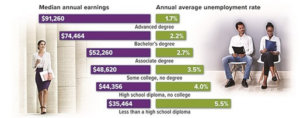$29,100 – Average cumulative debt for 2020–21 bachelor’s degree recipients who graduated with debt from public and private nonprofit four-year institutions; 54% of students graduated with debt. This was an improvement over the 2015–16 school year, when 60% of students graduated with an average debt of $32,100.
Source: College Board, 2022
While there is widespread concern about student debt and the cost of higher education, data from the U.S. Bureau of Labor Statistics makes a strong case that higher education leads to higher earnings and lower unemployment rates.
In 2022, median annual earnings for a full-time worker with a bachelor’s degree were about $30,000 more than for a worker with only a high school diploma, a difference of more than $1 million over a 35-year career. Even so, it’s important to be realistic about taking on debt in relation to expected earnings, as the job market and potential compensation can vary widely for different fields of study.

Source: U.S. Bureau of Labor Statistics, 2023 (data for ages 25 and older; annual earnings based on usual weekly earnings for full-time wage and salary workers)
Copyright 2006- Broadridge Investor Communication Solutions, Inc. All rights reserved.
Broadridge Investor Communication Solutions, Inc. does not provide investment, tax, or legal advice. The information presented here is not specific to any individual’s personal circumstances.
To the extent that this material concerns tax matters, it is not intended or written to be used, and cannot be used, by a taxpayer for the purpose of avoiding penalties that may be imposed by law. Each taxpayer should seek independent advice from a tax professional based on his or her individual circumstances.
These materials are provided for general information and educational purposes based upon publicly available information from sources believed to be reliable—we cannot assure the accuracy or completeness of these materials. The information in these materials may change at any time and without notice.
*Non-deposit investment products and services are offered through CUSO Financial Services, L.P. (“CFS”), a registered broker-dealer (Member FINRA / SIPC) and SEC Registered Investment Advisor. Products offered through CFS: are not NCUA/NCUSIF or otherwise federally insured, are not guarantees or obligations of the credit union, and may involve investment risk including possible loss of principal. Investment Representatives are registered through CFS. Coastal Federal Credit Union has contracted with CFS to make non-deposit investment products and services available to credit union members.
CFS representatives do not provide tax or legal guidance. For such guidance please consult with a qualified professional. Information shown is for general illustration purposes and does not predict or depict the performance of any investment or strategy. Past performance does not guarantee future results.
Trust Services are available through MEMBERS Trust Company. CFS* is not affiliated with Members Trust Company.
Any hypothetical example contained in this document are for illustrative purposes only. They do not represent the past or future portfolio composition or performance of any specific investment and are not intended as investment advice. We suggest working with your financial professional to see which allocation opportunities may be right for you.






